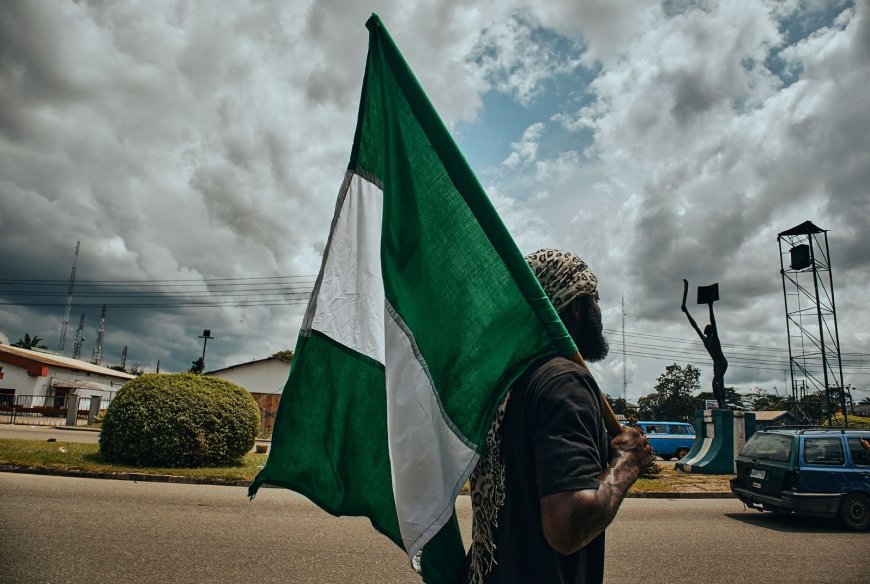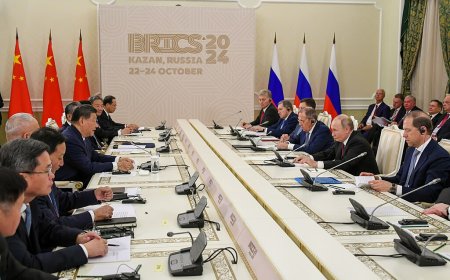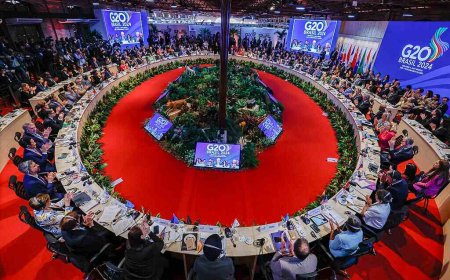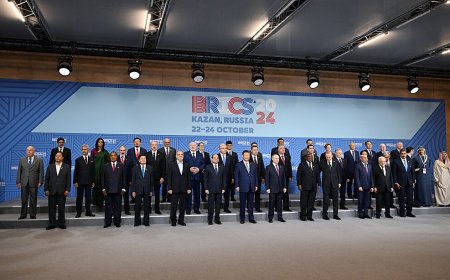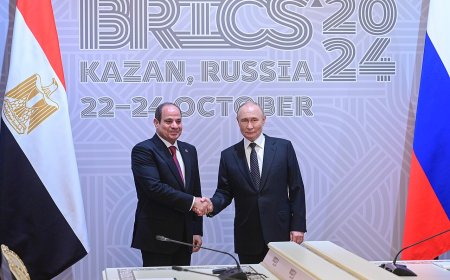This article is part of a series on the Nigerian 2023 Elections. The series is edited by Serwah Prempeh and Dr. Olumide Abimbola.
Summary
- The key drivers of the rising insecurity in Nigeria are economic concerns such as high unemployment rates.
- Overall, poor choices by Nigeria's political class have led to bad economic outcomes, which have pushed more people into poverty.
- The state of insecurity is projected to continue under the next administration because economic indicators show that Nigeria is not doing well.
- The conduct and outcome of February's elections will either create a despair of "more of the same" or induce a sense of hope.
Background
Nigeria has 36 states spread across six regions, each of which has security challenges. In the North-Central, made up of six states including Abuja, the national capital, the biggest security threat is the pastoral conflict over access to waterways between largely nomadic Fulani cattle herders and largely indigenous farmers over access to waterways. This conflict has worsened over the last eight years, fuelled by the indigenous ethnic groups’ mistrust of the central government led by Muhammadu Buhari, an ethnic Fulani. In the North-East, constituting six states, Boko Haram is a big threat. This jihadist movement, which entered global consciousness following the kidnapping of 276 girls in a school in Borno State, has splintered, with one faction pledging allegiance to the Islamic State. The group has become a terror to the farmers in the region, keeping many farmers away from their farms and imposing violence on the unrelenting. For example, in November 2020, Boko Haram killed about 43 subsistence farmers in Zabarmari, also in Borno State. In the North-West, consisting of seven states and Nigeria’s largest geopolitical zone by area, banditry is predominant. Various armed groups have made kidnapping an industry, culminating in an attack on a train in March 2022.
In the geopolitical zones in the South, the threats tend to be more transactional. However, in the South-East, a secessionist group, the indigenous people of Biafra, have in recent years taken to violence, forcing people to stay at home during workdays and attacking government representatives. In the South-South, the region that produces Nigeria’s oil supply, the threats come from armed groups that have morphed from fighting for the rights of the locals to make money from oil sales to large-scale oil theft and extortion. In the South-West, which includes the country’s commercial capital, Lagos, the biggest threat is from armed gangs, which engage in petty theft and extortion of transport workers.
Evidence suggests that a key determining factor of these security crises is Nigeria’s economic situation. Additionally, a quick bird's eye view of the security situation shows that the most insecure parts of the country - the North-East and the North-West - are also the poorest parts of the country. The same applies within other regions; endemic insecurity tends to be more predominant in the poorest parts. For example, in the North-Central, the richer areas around Abuja and Ilorin have not seen the pastoral conflict between herders and farmers. In contrast, in the South-East, the recent upsurge in violence by the secessionist group Indigenous People of Biafra has been largely limited to the rural areas or the highways between cities.
In November, the National Bureau of Statistics (NBS)'s Multidimensional Poverty Index Report stated that 133 million Nigerians (63 percent of the population) are in multidimensional poverty, with children constituting more than half of the poor people in the country. Before the coronavirus pandemic, SBM Intelligence, a Nigerian geopolitical intelligence platform, reported that Nigerians spent 62 percent of their income on food. With an ill-advised border closure, poor storage facilities, natural disasters such as floods and droughts and insecurity, food inflation had soared 24.13 percent by the time this piece was written, raising food bills and leaving less disposable income. The result is that people are resorting to crime to eat. The NBS report showed that southern Nigeria is facing similar challenges. For example, kidnappers released two victims after a ransom of foodstuff (rice, beans), cigarettes, gin, and a million Naira (₦) was paid.
This paper discusses Nigeria’s growing insecurity and how the security crisis is featuring in the 2023 election campaign. It argues co-constitutive relations between Nigeria's economy and the security crisis and how Nigeria’s political elite handle the responsibility of the public office. Dwindling state capacity and rent-seeking practices of political elites have created a vicious cycle of poverty. This poverty, in turn, is driving the rising insecurity in the country and reducing investment and economic activities, thus deepening the poverty that caused the insecurity in the first place. For many in the country, after the last eight years of stagflation, the elections in February present an opportunity to break this cycle.
Assessing the link between poverty, state capacity and insecurity
How did Nigerians become this poor? Many studies and analyses have linked the ongoing economic crisis to the declining standard of living since the end of the oil boom in 1979. However, for a section of the country, it started nearly a decade before. At the end of the Civil War in 1970, the Yakubu Gowon regime embarked on an oil-boom-funded reconstruction and rehabilitation programme in the Eastern region, which had seceded in 1967. Beyond the polished rhetoric of reconciliation lay a policy of vendetta and government-sanctioned victimisation. The allocation of just £20 to every one of Eastern origin regardless of what they had in their bank accounts before the war was a policy that brought everybody in the region to equal poverty levels. The poverty levels in the country’s South-East and other geopolitical zones created a desperate situation that saw many people resort to crime to survive.
Relatedly, while Nigeria’s economy is diversified, government revenues are predominantly dependent on oil. In recent times, however, oil production has been dwindling as Nigeria keeps falling below its OPEC quota due to oil theft, mismanagement of infrastructure and lack of state capacity. Also, due to an unsustainable and ineffective fuel subsidy regime that Nigeria’s political class has held on to - a scheme that benefits only a few privileged Nigerians - the revenue that should accrue to the federation account keeps dropping, thus shrinking Nigeria’s major source of foreign exchange. The Nigerian National Petroleum Company stated in September 2022 that it failed to remit any funds to the federation account for the eighth consecutive time due to fuel subsidy payments. The Nigerian government has gone on to allocate ₦3.6 trillion (€453 million at the end of 2022) for a petrol subsidy that basically gives money to the one percent of society who are plugged into government approved import monopolies for the first half of 2023 while allocating a meagre ₦6.4 trillion for the whole year’s capital expenditure out of a total budget of ₦21.83 trillion.
In addition, for almost 50 years, the Eastern Economic Corridor, which runs from Port Harcourt in the Niger Delta to Maiduguri in the North-East, was never rebuilt. Nigeria had to rely only on the Western Economic Corridor, which runs from Lagos in the South-West to its terminal point in Jibia, Katsina State. Another case in point is the devastating effects of the floods in Nigeria in 2022. The floods destroyed many farms in the North, displaced many from their homes and caused numerous deaths. Nigeria intended to build a dam that would contain the occasional release of water from Cameroon’s Lagdo Dam. While Cameroon completed its dam in 1982, Nigeria never built its own. In 2012, a director at the water resources ministry, Dr Emmanuel Adanu, was reported to have said it would take 36 months to complete Nigeria’s dam, for which a feasibility study had been completed in 1982. Yet, still nothing has happened. These cases of mismanagement adversely affected the standard of living for average Nigerians, pushing them into poverty and crime. They are indicative of the dwindling state capacity because, in all cases, the actions and inactions of public service holders has left Nigerians worse off.
Another example is the country’s COVID response. A primary reason the COVID lockdown in Nigeria was not as successful as the government hoped is dwindling state capacity across multiple fronts – security, social safety nets and corruption, among other factors. However, more to the point is that, as governments around the world rolled out palliative measures to keep their citizens locked in to slow down the spread of the virus, Nigeria's attempt to do the same quickly went overboard. Warehouses were stormed in the wake of the EndSARS protests of October 2020. This storming led to the discovery of several warehouses across the country where food relief tagged COVID Relief had been stashed away, leading to widespread social unrest in the country. Unfortunately, the government has opted to handle the rising insecurity the way it has always handled issues: through the use of force as a first option. Resultingly, we now have internal military operations in all 36 states and the capital, leading to an even greater cycle of violence.
Another point central to these issues is unemployment. Nigeria has a mean age of 18.1 years and unemployment is a major cause of youth restlessness and social unrest. The most recent NBS figures show an unemployment rate of 33 percent. This reality should naturally keep policymakers up at night, but Nigeria’s political elite have not responded to this issue with the seriousness it requires. Nigeria has not conducted a census since 2006, and policymakers are designing policy by projection, which creates room for waste, corruption and arbitrariness. A Chinese president who was asked what keeps him up at night answered ’lifting millions of people out of poverty’. That country finally realised this goal in April 2021. Nigeria has to take a step in this direction to address issues of insecurity.
The state of insecurity is projected to continue under the next administration because economic indicators show that Nigeria is not doing well. Inflation and insufficient power supply will remain, and violence ahead of the February 2023 elections could undermine momentum.
Does a new government hold any promises?
It is important to consider the kind of policies Nigeria’s political elite favour. In places where democracy is effective, the incentive is to improve the economy and the people's social well-being. In Nigeria's case, however, the predominant practice is that its political elites prioritise policies that hardly contribute to economic growth. Policies and actions such as border closure, import bans, multiple exchange rates, censures on the creative industry and a ban on any economic activity that cannot be controlled speak volumes in this regard. In Nigeria's commercial capital, Lagos, an incident comes to mind. When the Lagos State Government had to choose between tech-enabled motorcycle businesses and traditional transporters with their violent unions, they chose the latter. The latter has contributed a great deal to the social unrest in Lagos and Nigeria’s South-West. As the tensions rose, along with attacks by pastoralists, the state governments of the region came together in 2019 to form a regional police. By 2021, it was operational in five of the six states, with Lagos being the exception. The degree of effectiveness, however, varies.
The outcome of February’s elections will either create a sense of “more of the same” should the ruling party win or, should power change hands, will infuse a bit more trust in people that their democratic choices are being respected. So far, all Nigeria’s candidates have presented plans to tackle the issues of unemployment. While the ruling party candidate, Bola Tinubu, has promised to double down on the policies of the outgoing president, Muhammadu Buhari, the two main challengers, Atiku Abubakar and Peter Obi, have promised to move in other directions. Speaking of economic plans, the Labour Party spouts consumption to production, while the incumbent All Progressives Congress rails against the Fiscal Responsibility Act, which functions as a guardrail against unrestrained government spending, the likes of which will further tank the economy.
In a recent poll conducted by SBM Intelligence, most respondents said that the economy, the cost of living and unemployment, which they believe are the government’s duty to solve, were worse than they were a decade ago. Sadly, not many believe that any new government will tackle these issues. Many mentioned that one could only get a job by having a "connection" to the political class. The implication of this is an indictment on the political elite regarding patronage networks, which excludes people with little or no access to basic tools for survival. It also affirms the decline in state power or capacity argument I have asserted throughout this paper. It is one thing for the state to lack capacity and keep up appearances. It is another for the appearances to be seen through by the populace since that perception creates an air of delegitimisation of the government, leading to an apathy that enables the political class to self-perpetuate.
Ultimately, it is not only the Nigerian people that suffer the effect of these Machiavellian schemes. The immediate West African neighbourhood also suffers because the poor handling of the Nigerian economy creates a market for insecurity to thrive. Given the geographic span of Nigeria's borders, the crimes can take a transnational shape and destabilise other countries. Consequently, it takes political leadership with an understanding of a grand strategy to reign in the ruins, and the next set of elections does not promise to throw up that much-needed kind of leadership. If they are concerned about tackling insecurity, Nigeria’s political elites from the 2023 elections will have to take on the cloak of selfless service while seriously pushing policies that will enhance growth, prosperity, employment and social welfare.
About the Author
Cheta Nwanze is a versatile professional with more than fifteen years of work experience across Nigeria, the United Kingdom and the United States. He has vast experience in country, security and IT/Cyber risk advisory. Cheta is the Lead Partner at SBM Intelligence, a Nigeria-based geopolitical intelligence and risk management firm, which provides intelligence and solutions to issues bordering on Nigeria, the Sahel, Africa and their relationship with the world.
